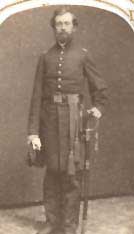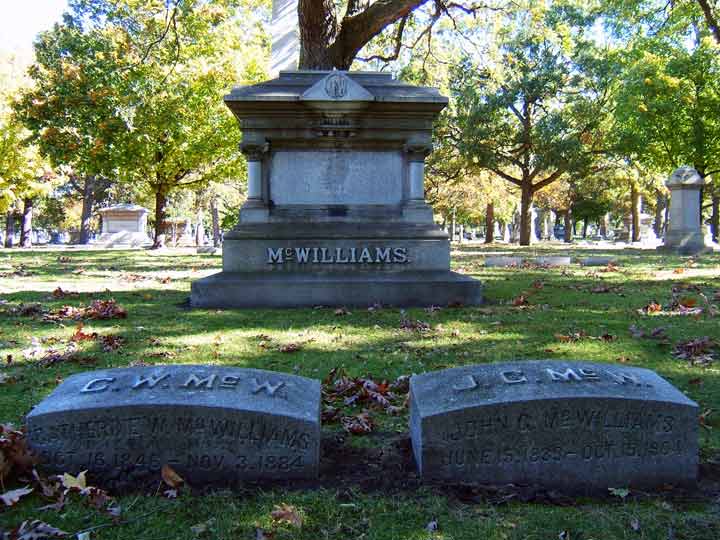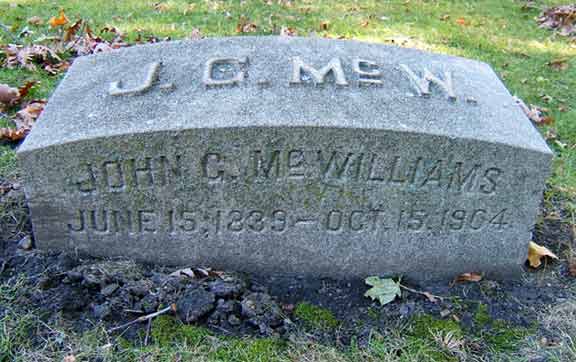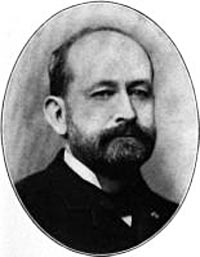 Captain John G. McWilliams
Captain John G. McWilliams
Company E
Civil War Years. John Galt McWilliams was one of the first to sign on with the Fifty-First Illinois—September 20, 1861. He already had experience as the captain of a militia company he had raised in Chicago. McWilliams was in field command of Company E throughout the Island No. 10, Farmington/Siege of Corinth, Alabama railroad guard, rush to Nashville, and Stones River campaigns of the regiment. Colonel Bradley and Major Raymond thought highly of McWilliams. In a letter to Sheridan, dated February 14, 1863, Raymond urged Sheridan to excuse McWilliams from service on a court martial panel. Raymond pleaded his own poor health, such "that I am unable to take the whole responsibility of the command and that Capt. J. G. McWilliams is the only officer capable of doing so now with the Regiment." Bradley seconded Raymond, "Captain McWilliams is one of the most faithful & diligent officers in the service." In the upshot, in March 1863 McWilliams was indeed temporarily in command of the regiment: Bradley was in command of the brigade; Westcott, the senior captain who had commanded the regiment at the end of the Battle of Stones River, was gone on leave and then never returned to the regiment; Raymond, the major, was ill.
In a letter of April 10, 1863, in which he requested leave to return to take care of urgent business matters—"I am likely to be defrauded"—McWilliams said he was one of the partners of the firm of W. R. Wood Dry Goods. He also wrote that at the time of his commission as Captain he expected "before a year rolled around to be back again". (Keeping track of Captain McWilliams' anniversaries, I cannot help but mention that, on his second anniversary with the regiment, to the day, he was taken captive in the collapse of the Federal right at Chickamauga on the afternoon of September 20, 1863. It was the last day of McWilliams' active service to the Fifty-First. He was promoted to major in March, 1864, while still somewhere in Confederate prison, but never officially mustered as major before the end of the war.)
McWilliams was granted leave in the second half of April 1863 to return to Chicago to set his affairs in order. While in Chicago, on April 21, 1863, McWilliams married the niece of an established Chicago attorney William H. Stickney (1809-1898). Her name was Mary Alice Wilmans; she was a school teacher. The new husband returned to war. The regiment marched hither and yon through Tennessee. It went into battle on the afternoon of September 19, 1863 at Chickamauga, Georgia. When Lt. Col. Raymond's horse panicked, McWilliams took over command of the regiment. On September 20, Chickamauga's second day, McWilliams was taken captive on the level ground between the Widow Glenn's hill and the hill where William Lytle brought his brigade of Sheridan's Division into line, to the left of the 51st and 22nd Illinois regiments.

When Stickney, in July 1864, wrote to the War Department to urge action for McWilliams' release, by exchange, from Confederate prison (friends and family had last heard from McWilliams in March when he was still at Libby Prison in Richmond), he wrote that McWilliams "was taken prisoner with flag staff in hand trying to rally his men." The Illinois congressional representative also put himself at the disposal of the effort to specially effect the exchange of McWilliams. Nothing happened—at the time (the Adjutant General's Office in Washington D. C. responded "that no exchanges can be effected at this time, but that the Department will omit no opportunity to obtain the release of Captain McWilliams at the earliest moment possible").
McWilliams and his wife never saw each other again. She died on January 29, 1864. "A wife for less than a year, Mrs. McWilliams has for many a weary month awaited her husband's liberation from the Libby prison. Her husband is still a prisoner, and their meeting only comes 'beyond the river'" (The Illinois Teacher: Devoted to Education, Science, and Free Schools, Volume 10, 1864, p. 138).
On October 3, 1864, in Charleston Harbor, South Carolina, McWilliams was exchanged by "special exchange" for Captain Henry Buist of Company G of the Twenty-Seventh South Carolina Infantry. Buist was a scion of a notable Charleston family. He was captured in June, 1864 at Petersburg, Virginia.
The Fifty-First's regimental muster rolls report McWilliams "absent with leave" for January-February, 1865. He mustered out of the service March 6, 1865: term of service expired. But, McWilliams had been reunited with his regimental comrades once more. He reported to the regiment on March 2, 1865 in Huntsville, Alabama where the regiment was spending the autumn of its tenure.
Before and After the War. McWilliams was born in Peterboro, Smithfield Township, Madison County, New York on June 15, 1839; his parents, Hugh and Mary (Wilson) McWilliams, had only recently immigrated from Ireland. He began earning his living in 1855 as a clerk in a dry goods store. In 1857 he moved to Chicago and continued his business career in dry goods with W. R. Wood. W. R. Wood did fail during the Civil War years as McWilliams feared, and after the war McWilliams started afresh with Field, Palmer & Leiter, as a salesman. He eventually became partner in the firm as he had been with W. R. Wood. He married Katherine Willard of Chicago (whose place of birth was also New York) in 1867. They had one son Roy. Katherine died in 1884. McWilliams married Caroline W. Lee on October 26, 1886 in Chicago.

On September 26, 1887, McWilliams' military record was amended to state that he was retroactively mustered in as major of the Fifty-First, to date to July 29, 1864. Simple justice.
McWilliams died of a cerebral hemorrhage on October 15, 1904, in Chicago. His obituary in The Chicago Tribune of October 16 read, "John G. McWilliams, for a number of years a member of the firm of Marshal Field & Co., died suddenly of apoplexy yesterday at his residence, 3045 Lake avenue. He was 65 years old. Funeral arrangements have not yet been made. Mr. McWilliams came to Chicago from New York state in 1857 and engaged in various pursuits until the outbreak of the civil war. He recruited and became a captain of a company of the Fifty-first regiment, Illinois volunteers, being commissioned major and remaining with the organization until the close of the war. Returning to Chicago, Mr. McWilliams obtained employment with the dry goods firm of Field, Palmer & Leiter, and in time became manager of the notion department. In a later reorganization of the firm he joined it as a partner and finally retiring eight years ago. After his retirement from active business life Mr. McWilliams traveled extensively abroad and in the United States and only two weeks ago returned with his wife from a three months' stay in Europe. He was a member of the Loyal Legion, the Chicago Athletic association, and of the Union League and Washington Park clubs. Members of the family who survive are the widow; a son, Roy McWilliams, who is an attorney; a brother, Lafayette McWilliams, and two sisters in New York."
McWilliams was buried in Rose Hill Cemetery in Chicago.
The Richest Man of the Regiment. The figures adduced in the filing of McWilliams' will make him a candidate for the regiment's richest veteran. This appeared in The Chicago Tribune of October 28, 1904: "The will of the late John G. McWilliams, filed for probate yesterday, disposes of an estate valued at $2,274,055, of which personal property is estimated at $2,167,506 and real estate at $107,250. Immediate relatives are the principal beneficiaries. To the widow is left one-third of the estate, real, personal, and mixed together with the homestead at 3045 Lake avenue, and the testator bequeaths $15,000 each to his sisters, Mrs. Mary Augusta Berry, Peterboro, N. Y., and Mrs. Florence J. Coe; $15,000 to E. Wilson Brown, a nephew, and $5,000 to John McWilliams Stone, son of Mr. and Mrs. James Dickie Stone. The son, Roy McWilliams, is to receive $20,000 per annum from a trust fund until he reaches the age of 30 years, after which the annuity will be $25,000 to the age of 35, when he will receive the remainder of the trust estate, with the exception of $50,000."
Andreas' Biographical Sketch. Alfred T. Andreas, in his History of Chicago, provided this short biographical sketch of McWilliams:
John G. McWilliams was born on June 13, 1839, at Peterboro, Madison Co., N. Y., and received his education at the Peterboro Academy. In the fall of 1855, he began his business career as a clerk in a dry-goods store at Peterboro, where he remained until February, 1857, when he came to Chicago, entering the retail dry goods house of W. R. Wood & Co., as a salesman. He remained in their employ until September, 1861, when he entered the 51st Illinois Infantry as captain, afterward being promoted to major in March, 1864, and serving until March, 1865, when he was honorably discharged. He then returned to Chicago and entered the employ of Field, Palmer & Leiter [later Marshall Field & Company], as a salesman, which position he held until he attained his present one of partner, in January, 1883. Mr. McWilliams was married, in 1867, to Miss K. M. Willard, of Chicago, who died in November, 1884, leaving one child, Roy.
Andreas elides McWilliams' post-war dry goods career, skipping over his year or so with Cooley, Farwell, Wadsworth, and Company, which at the time was Chicago's largest dry goods wholesaler, and of which Marshall Field was a junior partner. On January 1, 1867, Field, Palmer and Leiter dissolved; the new partnership was Field and Leiter. At this juncture McWilliams left his employer, Farwell, and went to work for Field and Leiter. Axel Madsen wrote that McWilliams showed up for his first day of work dressed in his uniform.
